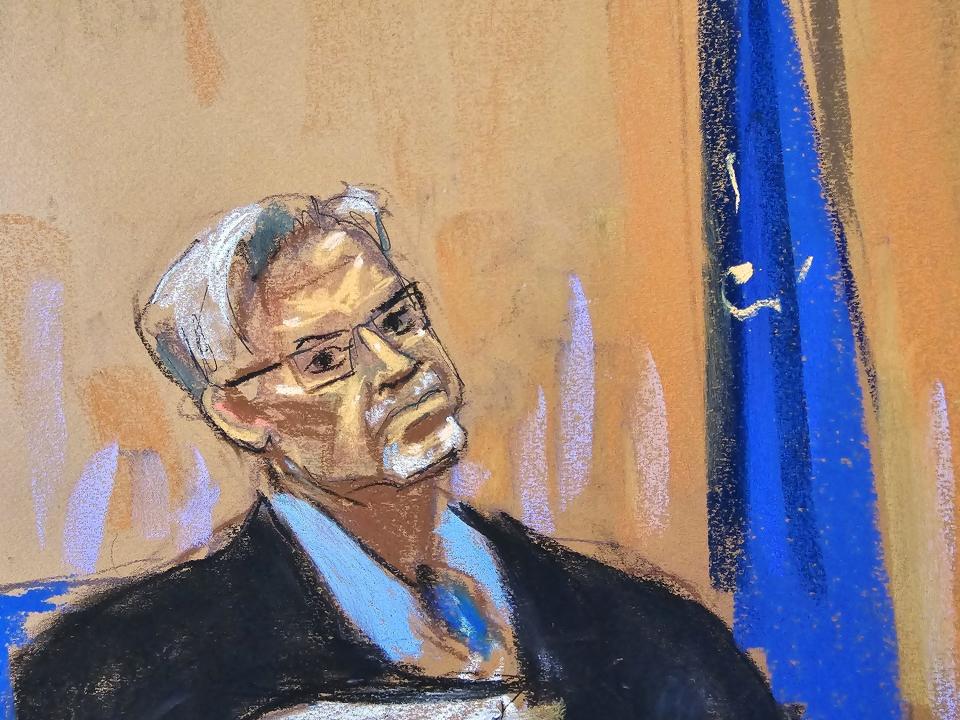Trump just debuted a new trial spin as the jury deliberates, claiming 'nobody knows what the crime is'

Donald Trump has debuted a new line of attack in his criminal trial.
"I DON'T EVEN KNOW WHAT THE CHARGES ARE IN THIS RIGGED CASE," he wrote on Truth Social.
Prosecutors charged Trump with 34 counts of falsifying business records more than a year ago.
The jurors in former President Donald Trump's criminal trial are thinking deeply about the charges.
After just a few hours of deliberating on Wednesday, they asked the judge to read back four crucial segments of the testimony they heard.
They homed in on sections that indicate they're seeking to understand granular details of the plot to keep Stormy Daniels silent about a sexual tryst she says she had with Trump ahead of the 2016 presidential election.
Trump, meanwhile, has brought a new line of attack against the proceedings: He says he doesn't know what's going on.
"I DON'T EVEN KNOW WHAT THE CHARGES ARE IN THIS RIGGED CASE—I AM ENTITLED TO SPECIFICITY JUST LIKE ANYONE ELSE," he posted on Truth Social after jurors began deliberating. "THERE IS NO CRIME!"
The New York district attorney's office charged Trump with 34 counts of falsifying business records in the first degree more than a year ago.
Over the course of more than a month, Trump sat through testimony from 20 witnesses and a five-hour closing argument from the prosecutor Joshua Steinglass laying out the case.
An entire day of testimony was spent going through those 34 records — invoices, checks, and ledger entries — in detail. Trump signed nine of those checks in his own hand with his mountain-range-style signature.
The judge already explained the charges
Reading into Trump's remarks and social-media posts on Wednesday, his campaign seems to be attempting to create confusion about a straightforward part of the jury's job.
The jury must reach a "guilty" or "not guilty" verdict on each of the 34 counts, one for each record.
On its own, the crime of "falsifying business records" in New York is considered a misdemeanor crime. But each count can be transformed into a felony if a jury finds that it was carried out in an attempt to commit or conceal another crime that would itself be a felony.
Prosecutors allege that the felony law Trump attempted to violate or cover up is section 17-152 of the New York Election Law, saying he conspired to promote himself in the 2016 presidential election "by unlawful means."
Prosecutors offered three different possible "unlawful means" carried out by Trump in the plot to pay Stormy Daniels hush money 11 days before the 2016 presidential election:
Violating federal campaign finance laws.
Causing certain invoices, bank records, or tax documents to include false information.
Submitting false tax documents.
Jurors need to unanimously agree on each of the 34 document-falsification counts to find Trump guilty.
But they do not need to agree on which of the three "unlawful means" Trump took as a path to falsify each document.
New York Supreme Court Justice Juan Merchan explained it clearly in his hourlong instructions to the jury on Wednesday morning.
"Although you must conclude unanimously that the defendant conspired to promote or prevent the election of any person to a public office by unlawful means, you need not be unanimous as to what those unlawful means were," Merchan told the jurors.
As Merchan gave the jury instructions, Trump's eyes appeared to be shut.
The 77-year-old Republican presidential candidate leaned back in his chair and sat still, his hands in his lap and mouth rested in a frown.
At one moment, he seemed to stretch his back and arms while remaining in his seat before settling back in his padded leather chair.

Last week, Merchan batted away an attempt from Trump's lawyer Emil Bove to require the jury to "make very specific findings" for the alleged violations of New York's election law. Trump kept his eyes closed through much of that court session, too.
"What you're asking me to do is change the law, and I'm not going to do that," Merchan told Trump's legal team.
As jurors began deliberating Wednesday, Trump's allies pushed a false narrative about their job.
Sen. Marco Rubio of Florida — who's widely believed to be under consideration as a running mate to Trump — posted on X, falsely claiming that the "Judge in Trump case in NYC just told jury they don't have to unanimously agree on which crime was committed."
It was reposted by Jason Miller, a senior advisor to Trump's campaign.
On Truth Social, Trump posted quotes from the Fox News host Jesse Watters falsely claiming that "the jury can pick whatever crime they want."
The jurors appeared to be seeking clarity on their role. They weren't permitted to take a copy of the judge's instructions into the deliberations room with them. And before the court day wrapped on Wednesday, they asked Merchan to read it aloud to them again.
By the end of the day, Trump appeared confused about what exactly he was supposed to be confused about.
"The other thing, the confusion is, nobody knows what the crime is, because there is no crime," Trump told reporters in the hallway outside the courtroom before he left. "Nobody knows what the crime is. The DA didn't name the crime. They don't know what the crime is."
Read the original article on Business Insider

 Yahoo News
Yahoo News 
